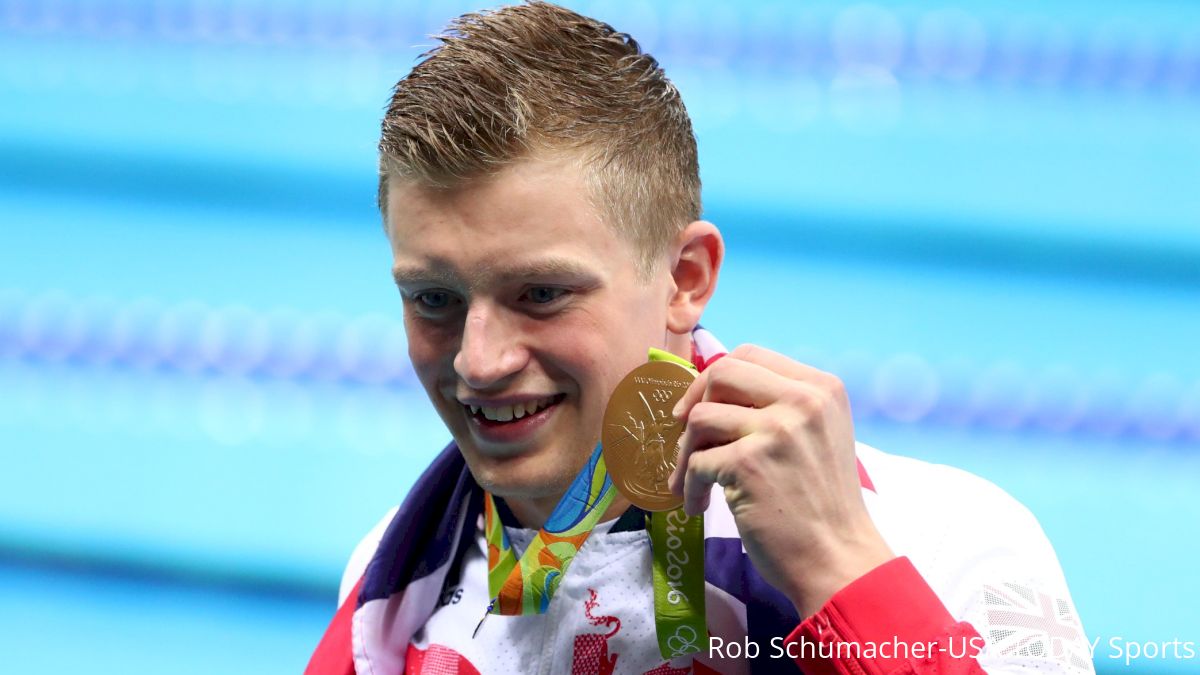Why Adam Peaty's World Record Proves the Future is Bright
Why Adam Peaty's World Record Proves the Future is Bright
British Breaststroker Adam Peaty Joins Elite Company with Record Swim after World Record Swim at the 2018 European Championships in Glasgow.

So far, this century has produced a multitude of record-breaking and multi-time medal-winning swimmers. Obviously, the great Michael Phelps comes to mind quickly. While undoubtedly the most successful Olympian of all, Phelps didn’t achieve a feat recently met by a younger swimmer.
British breaststroke star Adam Peaty recorded another World Record swim at the European Championships this month in Glasgow. As opposed to dethroning a record holder, Peaty simply reaffirmed his dominance by lowering his own record by 0.03. The swim came as a statement not to doubt the best.
Peaty failed to drop time for the first time at a major international competition last summer at the FINA World Championships in Budapest. Whenever a swimmer gains time, questions arise about whether or not they will hit their mark again. Obviously, there was nothing to worry about. He reversed any doubt.
Peaty joined elite company with this record-breaking swim. Only two swimmers this century have broken a world-record five or more consecutive years. The other, backstroke great Aaron Peirsol boasted a record-breaking swim each year between 2004 and 2009. Phelps achieved four straight twice in his career, separated by a recordless 2005.
Two female swimmers have reached the four-year mark as well. American distance legend Katie Ledecky (2013-2016) and Swedish sprinter Sarah Sjostrom (2014-2017). Sjostrom still has four months to drop a world record swim but as the long course season comes to a close, it isn’t all that likely.
Neither Peaty or Peirsol achieved the feat in a single event. Throughout swimming’s history, it is fairly rare to find a swimmer that has done that. A master of sprint breaststroke, Peaty is the best ever in the 50 and 100 breaststroke. Peirsol found his records in the 100 and 200 backstrokes, battling with Ryan Lochte for the honor.
Peaty smashed onto the scene, dropping from a 1:02 breaststroker at age 17 to a 59.9 at 18. The drops continued to mount as he dropped over two and a half seconds in a 100-meter race in two years. The cap on the large drop came between the 2016 European Championships and the Rio Olympic Games as Peaty knocked off the last 1.2 seconds. That type of improvement rocketed him from a world-class breaststroker to the uncontested best.
Adam Peaty, 50M Breaststroke
| Year | Meet | Time | Age |
| 2017 | FINA World Championships | 29.95 | 22 |
| 2015 | FINA World Championships | 26.42 | 20 |
| 2014 | European Championships | 26.62 | 19 |
Adam Peaty, 100M Breaststroke
| Year | Meet | Time | Age |
| 2018 | European Championships | 57.10 | 23 |
| 2016 | Olympic Games | 57.13 | 21 |
| 2015 | British Championships | 57.92 | 20 |
Aaron Peirsol, 100M Backstroke
| Year | Meet | Time | Age |
| 2004 | Olympic Games | 53.45 | 21 |
| 2005 | US National Championships | 53.17 | 21 |
| 2007 | World Championships | 52.98 | 23 |
| 2008 | US Olympic Trials | 52.89 | 24 |
| 2008 | Olympic Games | 52.54 | 25 |
| 2009 | US National Championships | 51.94 | 25 |
Aaron Peirsol, 200M Backstroke
| Year | Meet | Time | Age |
| 2009 | US National Championships | 01:53.1 | 25 |
| 2009 | FINA World Championships | 01:51.9 | 26 |
| 2008 | US Olympic Trials | 01:54.3 | 24 |
| 2006 | Pan Pacific Championships | 01:54.4 | 23 |
| 2005 | FINA World Championships | 01:54.7 | 22 |
| 2004 | US Olympic Trials | 01:54.7 | 20 |
While Peaty drew all eyes to his world record-setting swim, countryman James Wilby tied American Kevin Cordes as the third-fastest performer in history. Only South African Cameron van der Burgh stands between him and Peaty, although the time difference is well over a second.
Wilby, who is nearly a year older than Peaty, found a second wind in 2018. Wilby dropped dramatic amounts of time in his late teenage years but the drops stagnated for a few years. Fortunately, drops still continued through that time. From 2014-2017, he dropped less than a second in the 100 breaststroke. This year, he improved by 1.3 seconds.
Peaty has faced competition from within his own country. During his rise, Ross Murdoch was right on his toes. Still, the competition was often unsuccessful, especially in a long course race.
Of his closest competitors, Peaty is the youngest at 23-years-old. Van der Burgh is 30, Cordes recently turned 25, and Wilby is 24. The Olympic champion is still firmly in his prime and despite a slight bump in 2017, has emerged faster during the swimming’s so-called “down” summer. Peaty reminded everyone that whenever he steps on the blocks, record swims are possible.
He isn’t winding down yet. While the average age for Olympic gold medalists in the 100 breaststroke is just over 22-years-old, Peaty has given himself a buffer that can’t be erased easily. While Wilby inches near, Peaty remains on top of his game. After the swim in Glasgow, it’s hard to imagine he takes any steps back.
A year from now, after the FINA World Championships in Gwangju, there won’t be questions about when someone will slide below 57 seconds. There will surely be an abundance of swimmers, coaches, and fans in awe at the ability of the British breaststroker. A 56-second swim is on the horizon.